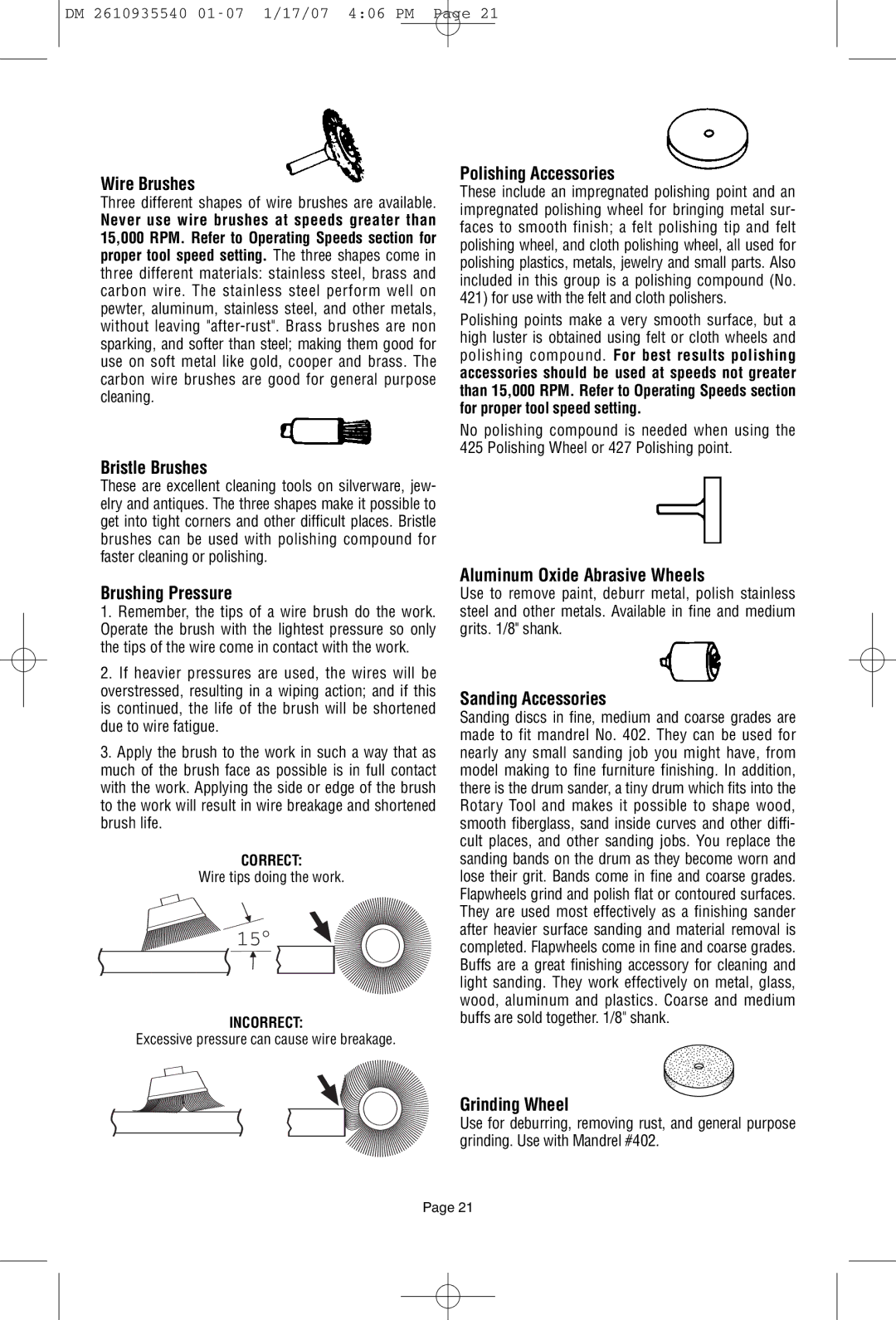
DM 2610935540
Wire Brushes
Three different shapes of wire brushes are available.
Never use wire brushes at speeds greater than 15,000 RPM. Refer to Operating Speeds section for proper tool speed setting. The three shapes come in three different materials: stainless steel, brass and carbon wire. The stainless steel perform well on pewter, aluminum, stainless steel, and other metals, without leaving
Bristle Brushes
These are excellent cleaning tools on silverware, jew- elry and antiques. The three shapes make it possible to get into tight corners and other difficult places. Bristle brushes can be used with polishing compound for faster cleaning or polishing.
Brushing Pressure
1.Remember, the tips of a wire brush do the work. Operate the brush with the lightest pressure so only the tips of the wire come in contact with the work.
2.If heavier pressures are used, the wires will be overstressed, resulting in a wiping action; and if this is continued, the life of the brush will be shortened due to wire fatigue.
3.Apply the brush to the work in such a way that as much of the brush face as possible is in full contact with the work. Applying the side or edge of the brush to the work will result in wire breakage and shortened brush life.
CORRECT:
Wire tips doing the work.
15°
INCORRECT:
Excessive pressure can cause wire breakage.
Polishing Accessories
These include an impregnated polishing point and an impregnated polishing wheel for bringing metal sur- faces to smooth finish; a felt polishing tip and felt polishing wheel, and cloth polishing wheel, all used for polishing plastics, metals, jewelry and small parts. Also included in this group is a polishing compound (No. 421) for use with the felt and cloth polishers.
Polishing points make a very smooth surface, but a high luster is obtained using felt or cloth wheels and polishing compound. For best results polishing accessories should be used at speeds not greater than 15,000 RPM. Refer to Operating Speeds section for proper tool speed setting.
No polishing compound is needed when using the 425 Polishing Wheel or 427 Polishing point.
Aluminum Oxide Abrasive Wheels
Use to remove paint, deburr metal, polish stainless steel and other metals. Available in fine and medium grits. 1/8" shank.
Sanding Accessories
Sanding discs in fine, medium and coarse grades are made to fit mandrel No. 402. They can be used for nearly any small sanding job you might have, from model making to fine furniture finishing. In addition, there is the drum sander, a tiny drum which fits into the Rotary Tool and makes it possible to shape wood, smooth fiberglass, sand inside curves and other diffi- cult places, and other sanding jobs. You replace the sanding bands on the drum as they become worn and lose their grit. Bands come in fine and coarse grades. Flapwheels grind and polish flat or contoured surfaces. They are used most effectively as a finishing sander after heavier surface sanding and material removal is completed. Flapwheels come in fine and coarse grades. Buffs are a great finishing accessory for cleaning and light sanding. They work effectively on metal, glass, wood, aluminum and plastics. Coarse and medium buffs are sold together. 1/8" shank.
Grinding Wheel
Use for deburring, removing rust, and general purpose grinding. Use with Mandrel #402.
Page 21
